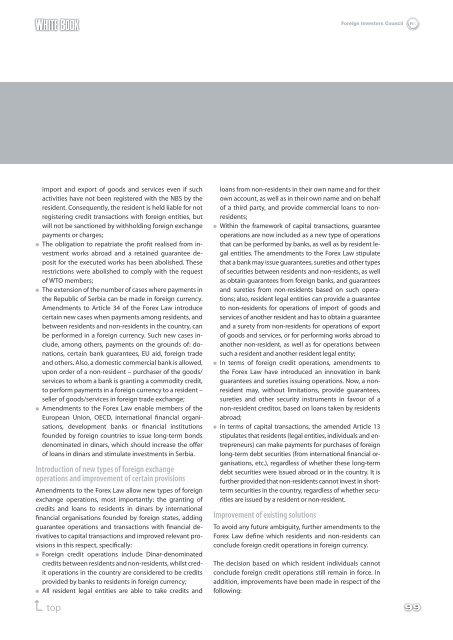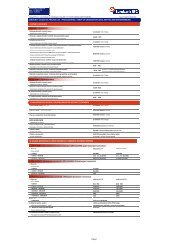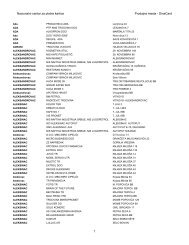Fic rEcommEndationS - Eurobank EFG
Fic rEcommEndationS - Eurobank EFG
Fic rEcommEndationS - Eurobank EFG
You also want an ePaper? Increase the reach of your titles
YUMPU automatically turns print PDFs into web optimized ePapers that Google loves.
import and export of goods and services even if such<br />
activities have not been registered with the NBS by the<br />
resident. Consequently, the resident is held liable for not<br />
registering credit transactions with foreign entities, but<br />
will not be sanctioned by withholding foreign exchange<br />
payments or charges;<br />
The obligation to repatriate the profit realised from investment<br />
works abroad and a retained guarantee deposit<br />
for the executed works has been abolished. These<br />
restrictions were abolished to comply with the request<br />
of WTO members;<br />
The extension of the number of cases where payments in<br />
the Republic of Serbia can be made in foreign currency.<br />
Amendments to Article 34 of the Forex Law introduce<br />
certain new cases when payments among residents, and<br />
between residents and non-residents in the country, can<br />
be performed in a foreign currency. Such new cases include,<br />
among others, payments on the grounds of: donations,<br />
certain bank guarantees, EU aid, foreign trade<br />
and others. Also, a domestic commercial bank is allowed,<br />
upon order of a non-resident – purchaser of the goods/<br />
services to whom a bank is granting a commodity credit,<br />
to perform payments in a foreign currency to a resident –<br />
seller of goods/services in foreign trade exchange;<br />
Amendments to the Forex Law enable members of the<br />
European Union, OECD, international financial organisations,<br />
development banks or financial institutions<br />
founded by foreign countries to issue long-term bonds<br />
denominated in dinars, which should increase the offer<br />
of loans in dinars and stimulate investments in Serbia.<br />
introduction of new types of foreign exchange<br />
operations and improvement of certain provisions<br />
Amendments to the Forex Law allow new types of foreign<br />
exchange operations, most importantly: the granting of<br />
credits and loans to residents in dinars by international<br />
financial organisations founded by foreign states, adding<br />
guarantee operations and transactions with financial derivatives<br />
to capital transactions and improved relevant provisions<br />
in this respect, specifically:<br />
Foreign credit operations include Dinar-denominated<br />
credits between residents and non-residents, whilst credit<br />
operations in the country are considered to be credits<br />
provided by banks to residents in foreign currency;<br />
All resident legal entities are able to take credits and<br />
� top<br />
loans from non-residents in their own name and for their<br />
own account, as well as in their own name and on behalf<br />
of a third party, and provide commercial loans to nonresidents;<br />
Within the framework of capital transactions, guarantee<br />
operations are now included as a new type of operations<br />
that can be performed by banks, as well as by resident legal<br />
entities. The amendments to the Forex Law stipulate<br />
that a bank may issue guarantees, sureties and other types<br />
of securities between residents and non-residents, as well<br />
as obtain guarantees from foreign banks, and guarantees<br />
and sureties from non-residents based on such operations;<br />
also, resident legal entities can provide a guarantee<br />
to non-residents for operations of import of goods and<br />
services of another resident and has to obtain a guarantee<br />
and a surety from non-residents for operations of export<br />
of goods and services, or for performing works abroad to<br />
another non-resident, as well as for operations between<br />
such a resident and another resident legal entity;<br />
In terms of foreign credit operations, amendments to<br />
the Forex Law have introduced an innovation in bank<br />
guarantees and sureties issuing operations. Now, a nonresident<br />
may, without limitations, provide guarantees,<br />
sureties and other security instruments in favour of a<br />
non-resident creditor, based on loans taken by residents<br />
abroad;<br />
In terms of capital transactions, the amended Article 13<br />
stipulates that residents (legal entities, individuals and entrepreneurs)<br />
can make payments for purchases of foreign<br />
long-term debt securities (from international financial organisations,<br />
etc.), regardless of whether these long-term<br />
debt securities were issued abroad or in the country. It is<br />
further provided that non-residents cannot invest in shortterm<br />
securities in the country, regardless of whether securities<br />
are issued by a resident or non-resident.<br />
improvement of existing solutions<br />
To avoid any future ambiguity, further amendments to the<br />
Forex Law define which residents and non-residents can<br />
conclude foreign credit operations in foreign currency.<br />
The decision based on which resident individuals cannot<br />
conclude foreign credit operations still remain in force. In<br />
addition, improvements have been made in respect of the<br />
following:<br />
99




